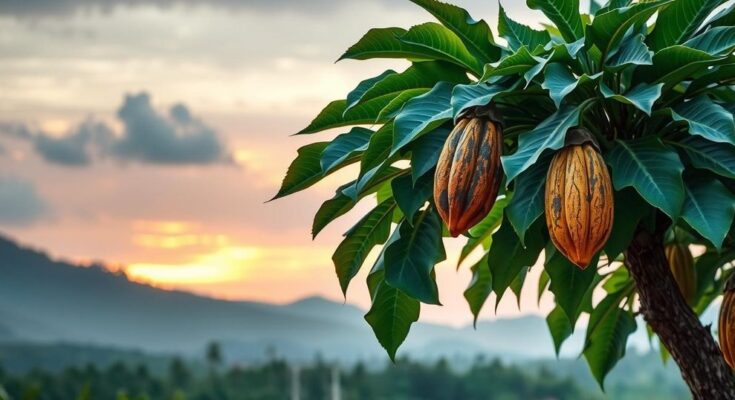A study indicates that climate change significantly affects cacao production in West Africa, causing reduced harvests and soaring cocoa prices. Key producers, particularly Ivory Coast and Ghana, face increased temperatures that hinder cacao tree health. The findings underscore the existential threat to cocoa farming due to extreme weather and emphasize the critical need for coordinated action against climate change.
Climate change is adversely affecting cacao production in West Africa, which supplies approximately 70 percent of the world’s chocolate. Last year, unusually high temperatures contributed to poor harvests and led to record cocoa prices. Farmers in Ivory Coast, Ghana, Cameroon, and Nigeria are particularly grappling with heat stress, plant diseases, and erratic rainfall, decreasing production further.
A report from Climate Central highlights how rising temperatures, driven by fossil fuel emissions, are becoming increasingly common in major cacao-producing countries. The study utilized data from 44 locations to show that over the past decade, climate change has extended periods of excessive heat, which negatively impacts cacao trees, particularly in Ivory Coast and Ghana.
The report noted that last year, days with temperatures surpassing 32 degrees Celsius increased substantially. Research indicates that such high temperatures can diminish both the quantity and quality of cacao harvests. Apart from heat, farmers are also contending with pests, shifting rainfall, and external challenges such as smuggling and illegal mining.
Christian Aid has published additional findings emphasizing the vulnerability of cacao farmers to climate-induced weather extremes. Director Osai Ojigho stated that the livelihoods of many poor communities depend on cocoa production, which is under severe threat due to human-caused climate change. In 2023, conditions oscillated between extreme rainfall and drought, significantly disrupting crops.
The ramifications of failed harvests have resulted in soaring cocoa prices in trading markets. Recently, New York cocoa prices surpassed $10,000 per ton, well above the historical range of $2,000 to $3,000 per ton. Lindt & Spruengli, a prominent Swiss chocolate manufacturer, announced intentions to increase prices to cope with climbing cocoa costs.
Professor Narcisa Pricope emphasized that cacao crops face an “existential threat” due to escalating dryness in cultivation regions. She underscored the significant role of greenhouse gas emissions in intensifying aridity. Pricope, citing research from the United Nations, noted that over 75 percent of global land has dried out over the past three decades, urging collective efforts to combat these challenges.
In summary, climate change poses a critical challenge to cacao production, leading to reduced harvests and skyrocketing cocoa prices. The findings from various studies underscore the urgent need for strategic interventions to support cocoa farmers and mitigate the impacts of rising temperatures and extreme weather. Addressing climate change is not only vital for preserving chocolate but is also integral to sustaining global agricultural practices and supporting vulnerable communities.
Original Source: www.sciencealert.com




